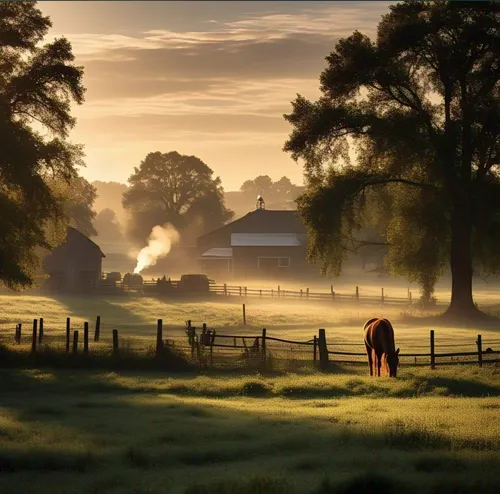That emptiness could exist in a space so thoroughly filled with life
When Abundance Fails to Fill the Void
The morning light cascades over the paddocks like liquid topaz, illuminating a tableau of life that would make any city dweller envious. Eight Maremma sheep dogs stretch and yawn at my feet—five girls and three great big boys, their massive white forms like drifts of snow against the landscape. In the distance, sheep dot the hillside like clouds that have fallen to earth, watched over by these gentle guardians who roam the property with purpose and quiet dignity. The donkeys bray their morning complaints about breakfast being four minutes late by their exacting standards. The geese form their usual parliament by the pond, necks arched in perpetual indignation. By any objective measure, I am surrounded by more life, more interaction, more raw existence than most humans on this planet.
Yet sometimes I stand in the middle of all this vibrant chaos and feel nothing at all.
The ennui arrives without warning, a fog that settles over the farm despite the clear blue sky above. It's not sadness exactly—that would require an object, a reason. This is emptiness, a curious hollowing out of meaning that makes even the most beautiful morning feel like watching someone else's dream unfold on a screen. The dogs still wag their tails when I approach, the sheep still bleat for grain, the chickens still perform their ridiculous dances for mealworms. But suddenly I am separated from it all by an invisible membrane, going through motions that yesterday felt purposeful and today feel like pantomime.
Who would have thought that loneliness could find you with eight beautiful dogs spread across several paddocks, their protective instincts always on high alert? That emptiness could exist in a space so thoroughly filled with life? The irony isn't lost on me as I mechanically fill water troughs and spread hay, my body present while my mind drifts like a balloon someone forgot to tie down.
I wonder sometimes if this is what city people imagine when they romanticise rural life—the solitude, the quiet, the distance from human complications. What they don't understand is that isolation doesn't simplify emotions; it amplifies them, gives them space to echo. In a city, this listlessness might be drowned out by the constant stimulation, the background hum of humanity. Here, it has room to stretch out, to make itself comfortable in the silence between bird calls.
Perhaps the strangest part is how this spiritual flatness coexists with love. I love these animals fiercely—each sheep with its distinct personality, each of the dogs with their particular neuroses, even the perpetually outraged geese. The emptiness doesn't erase that love; it just places it behind glass, visible but untouchable for a time.
Like looking at a photograph of someone dear and recognizing them without feeling the warmth of their presence.
I've learned not to fight it when it comes.
Fighting only entrenches it, gives it weight and substance it doesn't deserve. Instead, I acknowledge it as I would acknowledge a change in weather—noting its presence without judgment, continuing the essential work of the farm regardless of my internal climate. The animals don't care if I'm experiencing this peculiar void; they still need to eat, still need clean water, still need the routines that structure their days. And in that necessity lies the path back to meaning.
By evening, as I sit on the porch watching the light fade from the paddocks, the membrane between me and the world often begins to thin.
Sometimes it's a chicken—her ridiculous, earnest strut across the yard as though on urgent business—that pierces the veil first. Or perhaps the solemn procession of cattle returning to the barn, their shadows stretching long across the grass, their movements unhurried yet purposeful.
The numbness recedes like morning mist, not because circumstances have changed, but because this state, like all states, is temporary.
I wonder how many others experience this paradoxical disengagement amid abundance? How many farmers, artists, writers,or even city dwellers find themselves suddenly separated from meaning despite lives objectively full of purpose?
Perhaps this listless detachment isn't the absence of meaning but a necessary pause in our perception of it—a fallow period for the soul that, like fallow fields, prepares the ground for future growth.




This story has not been rated yet. Login to review this story.